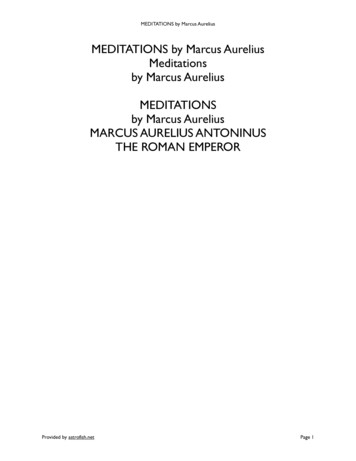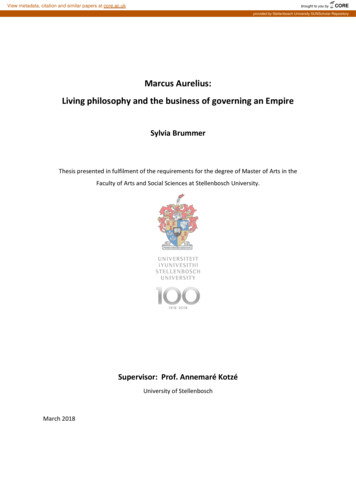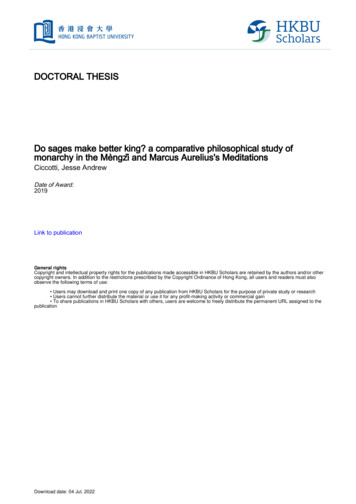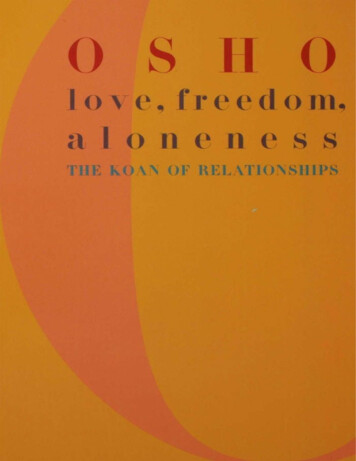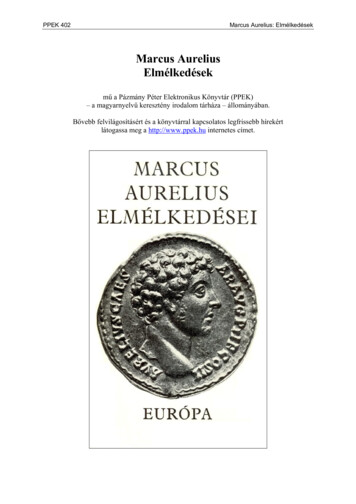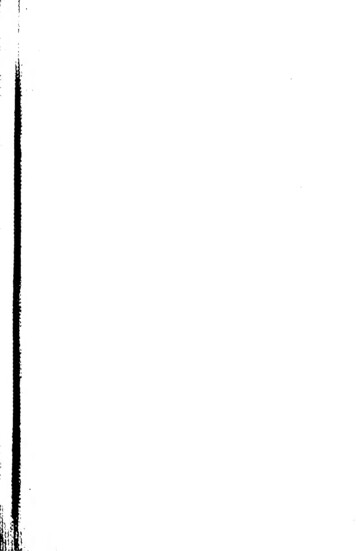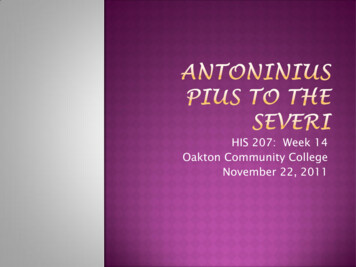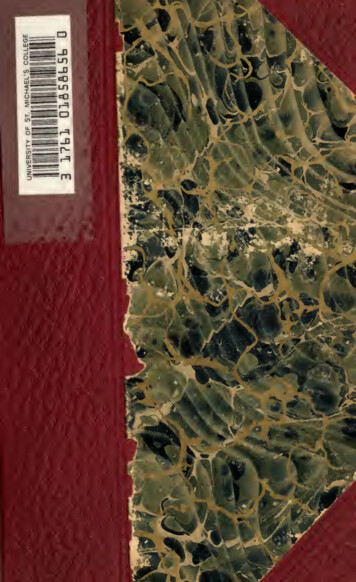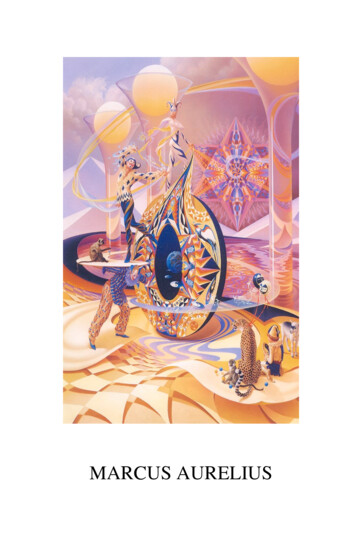
Transcription
MARCUS AURELIUS
I—2
THE OPPORTUNITY IN THIS TEXTIt is said that life is in continuous motion, a flux? Part of thatmotion is disintegration, since death is an intimate part of life.Therefore part of our life can be the effort to stop thecontinuous motion, for the decay part. (We don't really havea holistic view of it, because we tend to treat life and death asseparate entities, but can they be?) Then for the constructivepart of that motion, how does human life unfold?We could look at three ways.First, an outside influence can change and even radicallychange your life. A hurricane could blow your house downand that would put you into a whole new chapter of living.Or personal accidents, being attacked by robbers, investmentfailures and loss of money or resources will put a shift in yourlife. Far worse are the ravages of war, economic collapse, orfailure of government. Can it ever go in the other way withgood luck, war is finished and peace declared, pitch in torebuild the country, be assigned an important new position,win the lottery, uncle leaves you some money, a bumper cropthis year? Most of us don't experience these dramatic outsideswings anyway. (I don't say most people on earth, but mostof us reading this.)2. Barring outside catastrophe, I think the majority ofhumanity's lives change (or don’t) by following the herd.Herd of Sheep plus People equals Sheeple. Group Thinkfulfills man's social needs, and each culture has their ownherd, or divergence of herds. Usually the "base herd" isadopted until societal trust breaks down completely, then thevariety of sub-herds spread and obtain more adherence.Society, in essence, is a series of promises, and when thosepromises have been broken for decades (or centuries), trusterodes. The process is very slow, because in their heartspeople desperately want to find something to trust in.Even sophisticated people follow the herd, because what is itthat’s really new out there? It is all borrowed thought isn't it?I—3
But these elevated people search for ever-narrower herds tojoin and cautiously contribute to. What is the world ofexperts, in science, philosophy, medicine, economics,finance, governance, military, commerce, foreign relations,but a series of self-declaring herd-think. And only “RightHerd Think” get financed or position. If you're a participantin any of these fields you may have your own experiences.But for outsiders, it is only one herd or another herd. It is notso easy to find your preferred herd mentality. You can sit atthe cafe' with friends, but talk descends to the lowest commondenominator. "What should we have for lunch?" Well, that'sfriendship?For sure we are all subject to these two kinds of externalforces, to a greater or lesser degree. The opportunity in thistext is from a third direction, internal investigation.3. For most people life is sequential, and tomorrow flows outof our actions (or lack of actions) done today. I won't referany more to 'lack of actions', because there are alwaysactions, every minute. By lack of actions we mean no newactions, but just the status quo of what we have always optedto do. In ancient times it may have been hard to detect withinone man's lifetime, that Life is in continual change, but now itis very easy to see. Therefore one may surmise that meetinga changing life might take some new actions on our part. Atleast we could look to see if our old patterns are still adequateor optimum for what we now face.Our actions are generated from the thoughts that we entertain,and those thoughts spring from our held beliefs, sense ofjustice, and sense of right and wrong, (all conditioning).Most of these devolve into believed-in survival issues. Somonitoring our thoughts is a third way to change our actionsand thus renew our lives to be more adequate for thechanging times.Philosophy is said to be the reasoning art, but actually it isjust another system of thought, perhaps different from theones that you and I hold. It may also be a systemized methodI—4
of qualifying and judging thoughts, so that with its aid wemay be able to sort out and prioritize all of our thoughts, andthose of others that we interact with. Or at least it is analternative model, or a benchmark that we can compare withhow we operate. The whole exercise could also be adiscovery process, because all of our motivating thoughts(surely) are not at the surface of our consciousness. Then aswe investigate deeper we have the opportunity to decide if oldor buried thoughts may be obsolete, and discard them.Can we discard a thought? Sometimes they seem to come oftheir own volition. Perhaps it is a repeated process, discard,discard, discard. To really get it into the trash you have todetermine that it is no good, based on flawed or outdatedassumptions. Then every time you pick it up, you can smellhow rotten it is and drop it. Finally, the skill is that you don'tpick it up in the first place. There are millions of potentialthoughts to entertain. Why do I seem to see only these few?One seems more rotten than the other. You must be believingthat they are important for your survival? That is the criticalpoint to investigate, in order to progress to new thinking."I've gone this many years with these same beliefs". Doesthat prove their worth? It does indicate that the same old lifewill be forthcoming in our tomorrows. Does that suit us? Ifyou look at the human mind (your version of it), you surelynotice that a justification is being built for every old action,and for the lack of every new action. Therefore, does that suitus? The justifications say absolutely yes. So you can't breakout of the old, without examining these mental justifications."I've lived up until now with these patterns". Have you reallylived? If your routine and thoughts are always the same,aren't these repeated motions robotic? Are robots alive?Now you're invited to redefine life. Living is the continualfresh meeting of the changing conditions of life. I have acognitive power and five senses with which I can look out atthe circumstances, and determine how best to handle this newsituation. Gee, maybe I have never really met my life. Icontinually meet my father's life, or what he (and others) toldI—5
me life was all about. Even going back to his religiousscriptures.Where do we get moral teaching then? Well, at least withAbrahamic religions a messenger from God brings moralteachings, Moses, Jesus or Mohammed bring the scriptures. Ithink all religions have some "founding saints". But couldanything about life be self-evident? Or could God give rightliving to every person that is open to it? Usually modes oflife are reflected in each society. In a very aggressive society,everyone is very aggressive or if not, they are quicklyeliminated. On the other hand maybe in Switzerland, all carspolitely stop at a pedestrian crosswalk? Just imagine nowwhat world narratives (thoughts) we are daily being presentedwith? No matter which side of the multifaceted argumentsyou might be attracted to, the world seems an unredeemablechaotic mess, and getting worse by the day. Every persuasionleads to another problem. Solutions or compromises areforbidden discussions.One authentic place to look for the effect of right living is inthe quietness of the mind. If you reside in that aggressivesociety, your mind will be very noisy, always countering animminent threat to survival. So all those thoughts (of courseleading to actions), will be promoting more and more of thesame turmoil. That's not any improvement for the survival ofthe species. This until that society self-destructs. Will it takethe rest of the world with it? Maybe when your Being doesnot feel threatened, there is no need for a lot of thoughts, justpeaceful enjoyment, perhaps with creative urges. Then thequietness of the mind may be an indication of being on theright track. Being on the right track for the sustainability ofthe species, and for life on earth. People living with a quietmind might have been the world's origin of morality.For me this text is not a typical transference of information orknowledge from an expert author to the reader. It is a uniquetoolbox for equanimity. The knowledge and experience youobtain through equanimity will be totally your own. And itputs you and only you in control of your state of mind. VeryI—6
empowering. What are the tools for a quiet mind? Wellpeace resides in your opinions and your sense of justice. Ifeverything is judged as a threat, your mind is continuallytriggered. But even in the midst of threats or personalinconveniences, you may choose to believe that a part ofjustice is your endurance of seeming wrongs. You mayunderstand that in a wide world, could it be possible that therewould not be men with such a lack of common regard?Could it be possible that they will not do the things that theydo, even to you? Will you know that to wish for theimpossible is a sure recipe for your ill feeling? So with theerealizations the mind can be quiet even then.It is true that many (most) people don't want total peace ofmind. We have a belief that we should definitely counterwhat we disapprove of. Fine, we can enjoy peace of mindwith small things first, and see if it is a seed that will sprout.Or at least we will know the mechanism of internal peacewhen the going gets rough. Change our opinions, and wedon't have to take upsets seriously. We can investigate ourbelief that feeling bad somehow empowers us to resolve theseconditions in a better way. Is it true?What do you get from a quiet mind? Equanimity will changehow your life unfolds. I believe it will accelerate everythingyou consider good. It will also deliver things you never evendreamed of, this maybe the most important opportunity. Onething you begin to understand is right-living, and direct fromthe source, not through secondhand information, norscriptures nor commandments. So then you get to own rightliving, and not resist it. It becomes easy to keep to yourprecepts, because they are really yours. You get the ability tolisten, and to judge anew. You get a balance, and from thereyou get the ability to change direction quickly, to meet whatis new in the best possible way. Often satisfied that thingsare turning out for the better, you get a new confidence andtrust in yourself, as a more able participant in life. You areempowered to lead the best life possible for you, at this levelof awareness. You also get discovery. More oftenopportunities that you were not aware of become apparentI—7
because you are quiet, and can see what’s here. So this iswhere I am going to stop talking. Hereafter you can discoveron your own. I trust you to make the most of it.Marcus Aurelius Antoninus Augustus was Emperor of Romefrom 161 AD until his death, (in 180 AD), judged as the lastof the “Five Good Emperors.” He was nephew, son-in-law,and adopted son of Antonius Pius. Marcus Aurelius was oneof the most important Stoic Philosophers, as cited by H.P.Blavatsky amongst famous classic sages and writers such asPlato, Euripides, Socrates, Aristophanes, Pindar, Plutarch,Isocrates, Diodorus, Cicero, and Epictetus.In his own reign of some nineteen years, he would experiencenearly constant warfare, a horrific plague, possible infidelity,an attempt at the throne by one of his closest allies, repeatedand arduous travel across the empire—from Asia Minor toSyria, Egypt, Greece, and Austria—a rapidly depletingtreasury, an incompetent and greedy stepbrother as coemperor, and on and on and on.For sure many works about his life and countless studies onthe history, development and meaning of the StoicPhilosophy have been written. In fact I have here summarieson these subjects. But I don't want to elaborate them in thisvolume.I want to focus on the "Opportunity in this Text" alone,without many preconceptions as to what it is supposed to beabout. Talking “about” the text does not much. Then it isjust an arms length discussion of another bible. These are“actionable precepts”, which means you can experiment withand apply them right now, in the present tense. They are notjust a good idea for tomorrow. If you choose thisopportunity, you will know the result that I am inferring firsthand.Richard Miller 2020 in Chiang Mai Thailandnevernothere@protonmail.comI—8
MARCUS AURELIUSThe Meditations of Marcus Aurelius translated byThe meditations oLightly edited by Richard Miller (2020)Marcus Aurelius AnGeorge Long (1862), Cover from another editionT A B LEC ON TEN TSOFBOOK ONEI—10BOOK TWOII—21BOOK THREEIII—27BOOK FOURIV—37BOOK FIVEV—52BOOK SIXVI—66BOOK SEVENVII—82BOOK EIGHTVIII—97BOOK NINEIX—113BOOK TENX—128BOOK ELEVENXI—144BOOK TWELVEXII—157AFTERWARD QUESTIONSXIII—168Letters from Marcus AureliusNOTES: from earlier translationsXIV—174XV —194I—9
I. BOOK ONETO MY MENTORS1. From my grandfather Verus I learned good morals and thegovernment of my temper.From the reputation and remembrance of my father, modestyand a manly character.From my mother, piety and beneficence, and abstinence, notonly from evil deeds, but even from evil thoughts; andfurther, simplicity in my way of living, far removed from thehabits of the rich.From my great-grandfather, not to have frequented publicschools, and to have had good teachers at home, and to knowthat on such things a man should spend liberally.2. From my governor, to be neither of the green nor of theblue party at the games in the Circus, nor a partisan either ofthe Parmularius or the Scutarius at the gladiators’ fights; fromhim too I learned endurance of labor, and to want little, and towork with my own hands, and not to meddle with otherpeople’s affairs, and not to be ready to listen to slander.3. From Diognetus, not to busy myself about trifling things,and not to give credit to what was said by miracle-workersand jugglers about incantations and the driving away ofdaemons and such things; and not to breed quails for fighting,nor to give myself up passionately to such things; and toendure freedom of speech; and to have and become intimateI—10
with philosophy; and to have been a hearer, first of Bacchius,then of Tandasis and Marcianus; and to have writtendialogues in my youth; and to have desired a plank bed andskin, and whatever else of the kind belongs to the Greciandiscipline.4. From Rusticus I received the impression that my characterrequired improvement and discipline; and from him I learnednot to be led astray to sophistic emulation, nor to writing onspeculative matters, nor to delivering little hortatory (inciting)orations, nor to showing myself off as a man who practicesmuch discipline, or does benevolent acts in order to make adisplay; and to abstain from rhetoric, and poetry, and finewriting; and not to walk about in the house in my outdoordress, nor to do other things of the kind; and to write myletters with simplicity, like the letter which Rusticus wrotefrom Sinuessa to my mother; and with respect to those whohave offended me by words, or done me wrong, to be easilydisposed to be pacified and reconciled, as soon as they haveshown a readiness to be reconciled; and to read carefully, andnot to be satisfied with superficial understanding of books;nor hastily give my assent to those who talk overmuch; and Iam indebted to him for acquainting me with the discourses ofEpictetus, which he gave to me out of his own collection.5. From Apollonius I learned freedom of will and undeviatingsteadiness of purpose; and to look to nothing else, not evenfor a moment, except to reason; and to be always the same, insharp pains, on the occasion of the loss of a child, and in longillness; and to see clearly in a living example that the sameman can be both most resolute and yielding, and not peevishI—11
in giving his instruction; and to have had before my eyes aman who clearly considered his experience and his skill inexpounding philosophical principles as the smallest of hismerits; and from him I learned how to receive from friendswhat are esteemed favors, without being either humbled bythem or letting them pass unnoticed.6. From Sextus, a benevolent disposition, and the example ofa family governed in a fatherly manner, and the idea of livingconformably to nature; and gravity without affectation, and tolook carefully after the interests of friends, and to tolerateignorant persons, and those who form opinions withoutconsideration: he had the power of readily accommodatinghimself to all, so that intercourse with him was moreagreeable than any flattery; and at the same time he was mosthighly venerated by those who associated with him: and hehad the faculty of both discovering and ordering theprinciples necessary for life, in an intelligent and methodicalway; and he never showed anger or any other passion, butwas entirely free from passion, and also most affectionate;and he could express approbation (the proof or admiration)without noisy display, and he possessed much knowledgewithout ostentation.7. From Alexander the grammarian, to refrain from faultfinding, and not in a reproachful way to chide those whouttered any barbarous or solecistic (social blunders andsloppy syntax) or strange-sounding expression; butdexterously to introduce the very expression which ought tohave been used, and in the way of answer or givingconfirmation, or joining in an inquiry about the thing itself,I—12
not about the word, or by some other fit suggestion.8. From Fronto I learned to observe what envy, and duplicity,and hypocrisy are in a tyrant, and that generally those amongus who are called Patricians are rather deficient in paternalaffection.9. From Alexander the Platonic, not frequently nor withoutnecessity to say to anyone, or to write in a letter, that I haveno leisure; nor continually to excuse the neglect of dutiesrequired by our relation to those with whom we live, byalleging urgent occupations.10. From Catulus, not to be indifferent when a friend findsfault, even if he should find fault without reason, but to try torestore him to his usual disposition; and to be ready to speakwell of teachers, as it is reported of Domitius andAthenodotus; and to love my children truly.11. From my brother Severus, to love my kin, and to lovetruth, and to love justice; and through him I learned to knowThrasea, Helvidius, Cato, Dion, Brutus; and from him Ireceived the idea of a polity in which there is the same lawfor all, a polity administered with regard to equal rights andequal freedom of speech, and the idea of a kingly governmentwhich respects most of all the freedom of the governed; Ilearned from him also consistency and undeviating steadinessin my regard for philosophy; and a disposition to do good,and to give to others readily, and to cherish good hopes, andto believe that I am loved by my friends; and in him Iobserved no concealment of opinions with respect to those hecondemned, and that his friends had no need to conjectureI—13
what he wished or did not wish, but it was all quite plain.12. From Maximus I learned self-government, and not to beled aside by anything; and cheerfulness in all circumstances,as well as in illness; and a just admixture in the moralcharacter of sweetness and dignity, and to do what was setbefore me without complaining. I observed that everybodybelieved that he thought as he spoke, and that in all that hedid he never had any bad intention; and he never showedamazement and surprise, and was never in a hurry, and neverput off doing a thing, nor was perplexed nor dejected, nor didhe ever laugh to disguise his vexation, nor on the other hand,was he ever passionate or suspicious. He was accustomed todo acts of beneficence, and was ready to forgive, and was freefrom all falsehood; and he presented the appearance of a manwho could not be diverted from right rather than of a manwho had been improved. I observed too, that no man couldever think that he was despised by Maximus, nor ever ventureto think himself a better man. He had also the art of beinghumorous in an agreeable way.13. In my father I observed mildness of temper, andunchangeable resolution in the things which he haddetermined after due deliberation; and no vainglory in thosethings which men call honors; and a love of labor andperseverance; and a readiness to listen to those who hadanything to propose for the common weal; and undeviatingfirmness in giving to every man according to his deserts; anda knowledge derived from experience of the occasions forvigorous action or for remission. And I observed that he hadovercome all passion for boys; and he considered himself noI—14
more than any other citizen; and he released his friends fromall obligation to sup with him or to attend him of necessitywhen he went abroad, and those who had failed to accompanyhim, by reason of any urgent circumstances, always foundhim the same. I observed too his habit of careful inquiry in allmatters of deliberation, and his persistency, and that he neverstopped his investigation through being satisfied withappearances which first present themselves; and that hisdisposition was to keep his friends, and not to be soon tired ofthem, nor yet to be extravagant in his affection; and to besatisfied on all occasions, and cheerful; and to foresee thingsa long way off, and to provide for the smallest withoutdisplay; and to check immediately popular applause and allflattery; and to be ever watchful over the things which werenecessary for the administration of the empire, and to be agood manager of the expenditure, and patiently to endure theblame which he got for such conduct; and he was neithersuperstitious with respect to the gods, nor did he court menby gifts or by trying to please them, or by flattering thepopulace; but he showed sobriety in all things and firmness,and never any mean thoughts or action, nor love of novelty.And the things which conduce in any way to the commodityof life, and of which fortune gives an abundant supply, heused without arrogance and without excusing himself; so thatwhen he had them, he enjoyed them without affectation, andwhen he had them not, he did not want them. No one couldever say of him that he was either a sophist or a home-bredflippant slave or a pedant; but every one acknowledged himto be a man ripe, perfect, above flattery, able to manage hisown and other men’s affairs. Besides this, he honored thoseI—15
who were true philosophers, and he did not reproach thosewho pretended to be philosophers, nor yet was he easily ledby them. He was also easy in conversation, and he madehimself agreeable without any offensive affectation. He tooka reasonable care of his body’s health, not as one who wasgreatly attached to life, nor out of regard to personalappearance, nor yet in a careless way, but so that, through hisown attention, he very seldom stood in need of thephysician’s art or of medicine or external applications. Hewas most ready to give way without envy to those whopossessed any particular faculty, such as that of eloquence orknowledge of the law or of morals, or of anything else; andhe gave them his help, that each might enjoy reputationaccording to his deserts; and he always acted conformably tothe institutions of his country, without showing anyaffectation of doing so. Further, he was not fond of changenor unsteady, but he loved to stay in the same places, and toemploy himself about the same things; and after hisparoxysms of headache he came immediately fresh andvigorous to his usual occupations. His secrets were not butvery few and very rare, and these only about public matters;and he showed prudence and economy in the exhibition of thepublic spectacles and the construction of public buildings, hisdonations to the people, and in such things, for he was a manwho looked to what ought to be done, not to the reputationwhich is got by a man’s acts. He did not take the bath atunseasonable hours; he was not fond of building houses, norcurious about what he ate, nor about the texture and color ofhis clothes, nor about the beauty of his slaves. His dress camefrom Lorium, his villa on the coast, and from LanuviumI—16
generally. We know how he behaved to the toll-collector atTusculum who asked his pardon; and such was all hisbehavior. There was in him nothing harsh, nor implacable,nor violent, nor as one may say, anything carried to thesweating point; but he examined all things severally, as if hehad abundance of time, and without confusion, in an orderlyway, vigorously and consistently. And that might be appliedto him which is recorded of Socrates, that he was able both toabstain from, and to enjoy, those things which many are tooweak to abstain from, and cannot enjoy without excess. Butto be strong enough both to bear the one and to be sober inthe other is the mark of a man who has a perfect andinvincible soul, such as he showed in the illness of Maximus.14. To the gods I am indebted for having good grandfathers,good parents, a good sister, good teachers, good associates,good kinsmen and friends, nearly everything good. Further, Iowe it to the gods that I was not hurried into any offenceagainst any of them, though I had a disposition which, ifopportunity had offered, might have led me to do somethingof this kind; but through their favor, there never was such aconcurrence of circumstances as put me to the trial. Further, Iam thankful to the gods that I was not longer brought up withmy grandfather’s concubine, and that I preserved the flowerof my youth, and that I did not make proof of my virilitybefore the proper season, but even deferred the time; that Iwas subjected to a ruler and a father who was able to takeaway all pride from me, and to bring me to the knowledgethat it is possible for a man to live in a palace withoutwanting either guards or embroidered dresses, nor torches andstatues, and such-like show; but that it is in such a man’sI—17
power to bring himself very near to the fashion of a privateperson, without being for this reason either meaner inthought, nor more remiss in action, with respect to the thingswhich must be done for the public interest in a manner thatbefits a ruler. I thank the gods for giving me such a brother,who was able by his moral character to rouse me to vigilanceover myself, and who at the same time, pleased me by hisrespect and affection; that my children have not been stupidnor deformed in body; that I did not make more proficiencyin rhetoric, poetry, and the other studies, in which I shouldperhaps have been completely engaged, if I had seen that Iwas making progress in them; that I made haste to place thosewho brought me up in the station of honor, which theyseemed to desire, without putting them off with hope of mydoing it some time after, because they were then still young;that I knew Apollonius, Rusticus, Maximus; that I receivedclear and frequent impressions about living according tonature, and what kind of a life that is, so that, so far asdepended on the gods, and their gifts, and help, andinspirations, nothing hindered me from forthwith livingaccording to nature, though I still fall short of it through myown fault, and through not observing the admonitions of thegods, and I may almost say, their direct instructions; that mybody has held out so long in such a kind of life; that I nevertouched either Benedicta or Theodotus, and that, after havingfallen into amatory passions, I was cured; and though I wasoften out of humor with Rusticus, I never did anything ofwhich I had occasion to repent; that, though it was mymother’s fate to die young, she spent the last years of her lifewith me; that, whenever I wished to help any man in his need,I—18
or on any other occasion, I was never told that I had not themeans of doing it; and that to myself the same necessity neveroccurred, to receive anything from another; that I have such awife, so obedient, and so affectionate, and so simple; that Ihad abundance of good masters for my children; and thatremedies have been shown to me by dreams, both others, andagainst blood coughing and dizziness.; and that, when I hadan inclination to philosophy, I did not fall into the hands ofany sophist, and that I did not waste my time on writers ofhistories, or in the resolution of syllogisms, or occupy myselfabout the investigation of appearances in the heavens; for allthese things require the help of the gods and fortune.15. Among the Quadi at the Granua. (war with a Germanictribe on a tributary of the Danube) Begin in the morning bysaying to yourself, I shall meet with the busy-body, theungrateful, arrogant, deceitful, envious, unsocial. All thesethings happen to them by reason of their ignorance of what isgood and evil. But I who have seen the nature of the good thatit is beautiful, and of the bad that it is ugly, and the nature ofhim who does wrong, that it is akin to me, not only of thesame blood or seed, but that it participates in the sameintelligence and the same portion of the divinity, I can neitherbe injured by any of them, for no one can fix on me what isugly, nor can I be angry with my kinsman, nor hate him, Forwe are made for co-operation, like feet, like hands, likeeyelids, like the rows of the upper and lower teeth. To actagainst one another then is contrary to nature; and it is actingagainst one another to be vexed and to turn away.16. Whatever this is that I am, it is a little flesh and breath,and the ruling part. Throw away your books; no longerI—19
distract yourself: it is not allowed; but as if you were nowdying, despise the flesh; it is blood and bones and a network,a contexture of nerves, veins, and arteries. See the breath also,what kind of a thing it is, air, and not always the same, butevery moment sent out and again sucked in. The third then isthe ruling part: consider thus: You are an old man; no longerlet this be a slave, no longer be pulled by the strings like apuppet to unsocial movements, no longer either bedissatisfied with your present lot, or shrink from the future.17. All that is from the gods is full of Providenc
Marcus Aurelius Antoninus Augustus was Emperor of Rome from 161 AD until his death, (in 180 AD), judged as the last of the "Five Good Emperors." He was nephew, son-in-law,
